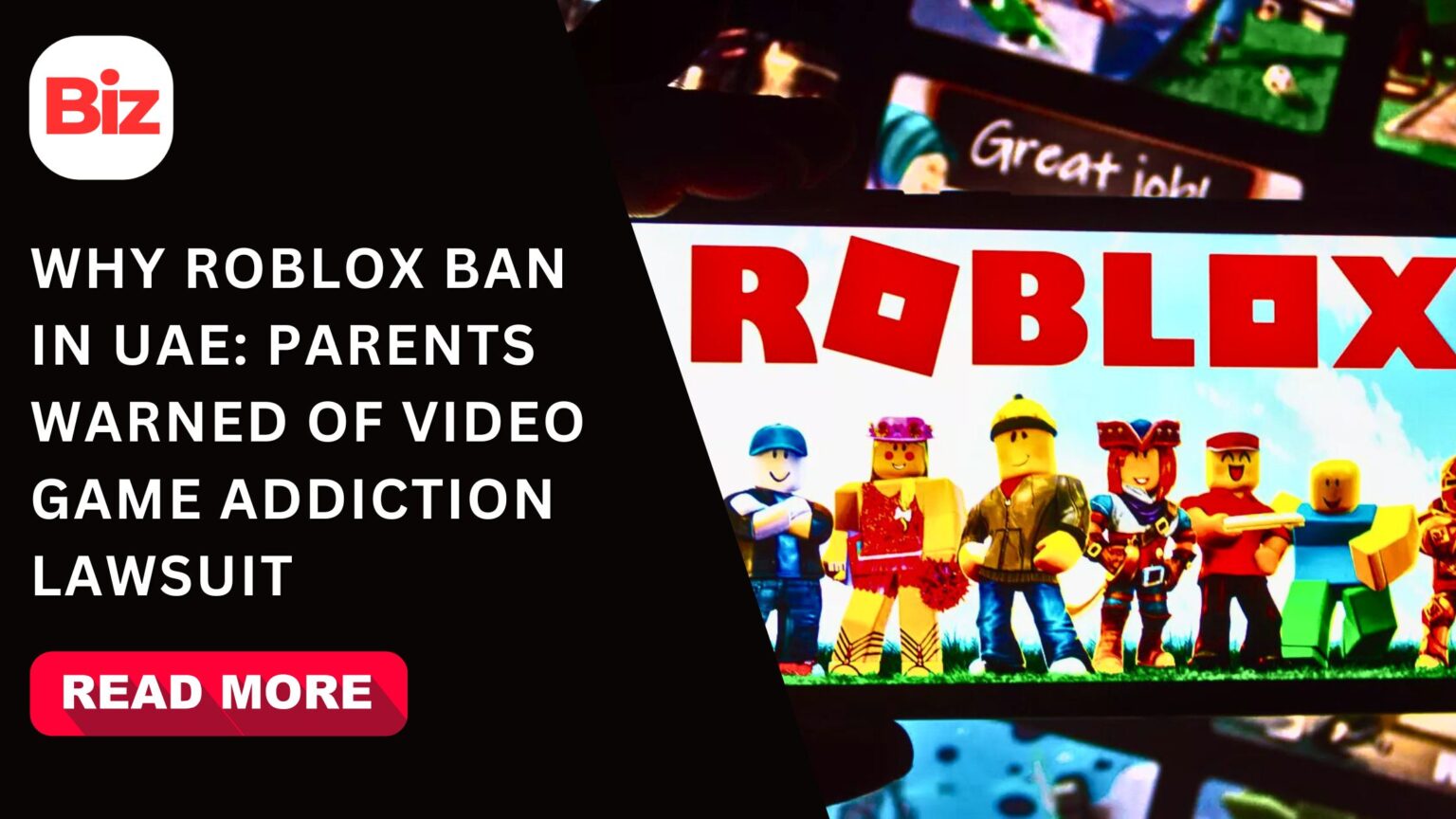Dubai: Roblox, one of the world’s most popular gaming platforms, is facing growing pressure as safety concerns, technical failures, and even a video game addiction lawsuit raise fresh doubts about its future.
What was once promoted as a safe and creative space for children has now become a source of parental concern—mirroring past debates such as the Roblox ban in UAE.
So, is Roblox really safe for kids? The answer is no longer simple. While the platform cannot be branded as completely unsafe, ongoing safety problems and rising legal challenges highlight why Roblox was banned in UAE in the first place—and why parents and regulators continue to sound the alarm today.
Why Is Roblox a Growing Concern in the UAE?
While policies shift over time, parental warnings and regulatory scrutiny in the UAE and across the region have typically centered on three fronts:
- Child safety and grooming risks
- Reports and watchdog claims say children can encounter sexually suggestive content or older users attempting to move conversations to unmonitored apps (e.g., Discord, Snapchat).
- Critics argue automated moderation sometimes misses harmful experiences long enough to cause real harm.
- Moderation and age verification
- Allegations in lawsuits and media coverage claim that verification and filtering are flawed or inconsistently enforced, leaving gaps predators can exploit.
- Community backlash has included instances where users attempting to expose predators reported being suspended, undermining trust.
- Viral rumors and outages
- Frequent, large-scale outages frustrate families and creators alike, stoking rumors of shutdowns and fueling calls for stronger oversight.
- Social media amplifies anxiety, even when platforms dispute or address the claims.
Roblox counters that “bad actors” exist across the internet, not only on its platform, and that it’s investing in stricter age verification, content bans targeted at sexual content, and AI tools to shut down inappropriate experiences.
Why Parents Are Raising Concerns
- Legal pressure increases: As high-profile cases hit Roblox in the US, with one accusing the company of failing to safeguard children from sexual exploitation and relying on defective moderation and age-check systems.
- Disturbing research findings: Studies cited in The Guardian reveal that children’s avatars can easily encounter sexually suggestive environments and interact with adults in ways that could lead to grooming.
- Failed moderation: The site relies heavily on automated AI to police content. Critics say this effort is inadequate, leaving off-color content on display for months. Anti-predator efforts have even resulted in the suspension of some watchdog accounts, enflaming backlash.
- Off-platform risks: Even with in-game chat filters, predators often move conversations to unmonitored apps like Discord or Snapchat, bypassing Roblox’s safety mechanisms entirely.
Growth Amid Crisis: The Paradox
Despite criticism, Roblox continues to expand. Recent reporting cites:
- Over 111 million daily active users in Q2 2025 and 27+ billion hours of engagement in that quarter.
- Mobile drives roughly 80% of usage.
- Flagship experiences like Brookhaven RP attract tens of billions of visits.
- Quarterly revenue over 1billion,withcreatorscollectivelyearningmorethan1 billion, with creators collectively earning more than 1billion,withcreatorscollectivelyearningmorethan1 billion in the last year.
This creates a paradox: even as safety and moderation concerns intensify, engagement and creator economies grow—keeping the platform deeply embedded in kids’ digital lives.
How Video Games Affect the Brain Negatively
Gaming can be positive in moderation (hand–eye coordination, spatial skills, social connection), but excessive or unmonitored play has documented downsides:
- Reward-system hijacking
Fast reward loops and variable-ratio reinforcement can over-activate dopaminergic pathways, making it harder for young brains to self-regulate and seek slower, real-world rewards.
- Attention and impulse control
Heavy, unstructured screen time is associated in research with worsened attention, reduced patience, and heightened impulsivity in some children.
- Sleep disruption
Evening play, blue light exposure, and heightened arousal can delay melatonin release and degrade sleep quality—undermining memory, mood, and school performance.
- Mood and social health
Overuse correlates with increased anxiety and depressive symptoms in some kids, especially if gaming replaces offline socializing, physical activity, or family time.
- Academic trade-offs
Time displacement (homework, reading, extracurriculars) is a reliable risk when daily gaming creeps beyond agreed limits.
Parents searching “how video games affect the brain negatively” should note: risk rises with age-inappropriate content, unmoderated social features, late-night use, and lack of parental oversight.
The “Video Game Addiction Lawsuit” Landscape
- Litigation is expanding
Around the world, parents and regulators are testing legal theories that platforms failed to reasonably protect children or designed experiences to be excessively addictive.
Cases focus on alleged defects in moderation, age checks, and interface mechanics designed to maximize engagement or spending.
- Regulatory momentum
Some countries and regions are introducing stricter rules for age verification, in-game spending disclosures, and data protection for minors.
- What it means for families
Lawsuits raise awareness but take years to resolve. In the meantime, the most effective protection is local: configure parental controls, limit play windows, and talk openly about online risks.
Why Was Roblox Banned in UAE?
Searches for “why was Roblox banned in uae” often spike when:
- Authorities issue child-safety advisories or schools warn parents.
- News stories about moderation failures, grooming cases, or lawsuits trend on social media.
- Regional ISPs or regulators apply temporary restrictions pending review.
The underlying drivers tend to be the same: protection of minors, concerns over chat features, and the difficulty of policing user-generated content at scale. Status can change, so parents should check official local guidance and stay informed via schools and telecom regulators.
The question goes beyond “Is Roblox safe?”—it asks, “How do we make digital play safer?” As searches rise for why Roblox was banned in UAE and video game addiction lawsuit trends, parents protect children best with layered strategies: using parental controls, ensuring visibility, teaching awareness, and keeping steady conversations. Platforms evolve; your family’s guardrails should, too.
FAQs
- Why is Roblox ban in UAE?
Mainly child-safety worries: chat risks, moderation gaps, and grooming concerns. Some providers or authorities have issued temporary restrictions—check your ISP and UAE regulators for current status
- Is Roblox safe for kids?
It can be safer with strong parental controls and oversight, but risks remain—especially in social, user-generated experiences.
- How do video games affect the brain negatively?
Too much play (especially late) can hurt sleep, attention, mood, and self-control—and crowd out homework, exercise, and family time.
- What is a video game addiction lawsuit?
Legal cases claim platforms didn’t protect kids or used design that encourages addictive play, sometimes alongside weak age checks/moderation.
- Should I let my child play Roblox?
Many parents do—with limits on time, chat, content, and spending, plus active involvement. If you can’t supervise, consider waiting.








